中国餐桌礼仪文化-五部分-含英文
- 格式:ppt
- 大小:4.48 MB
- 文档页数:52
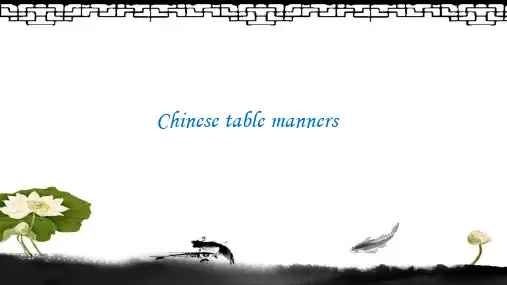
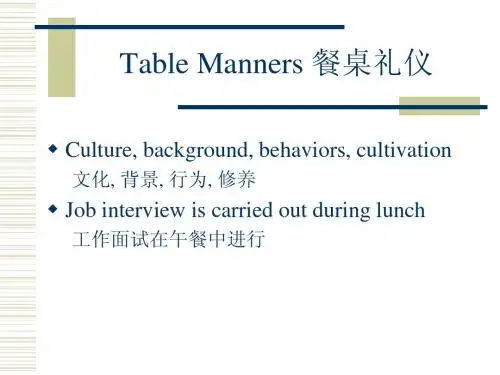
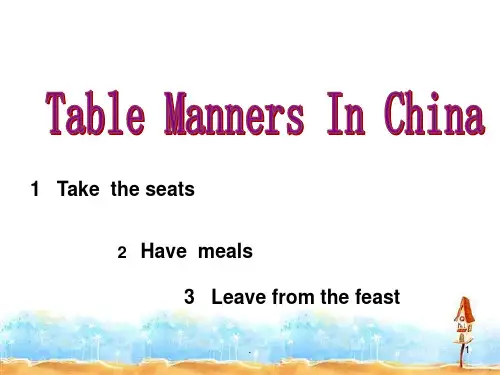
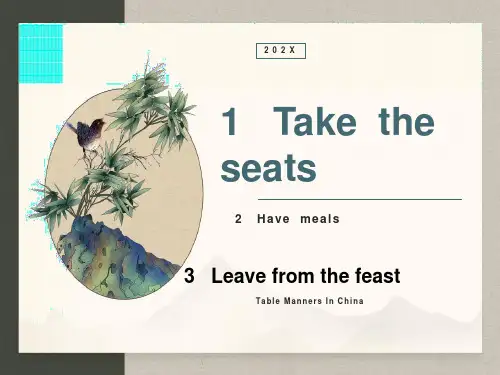
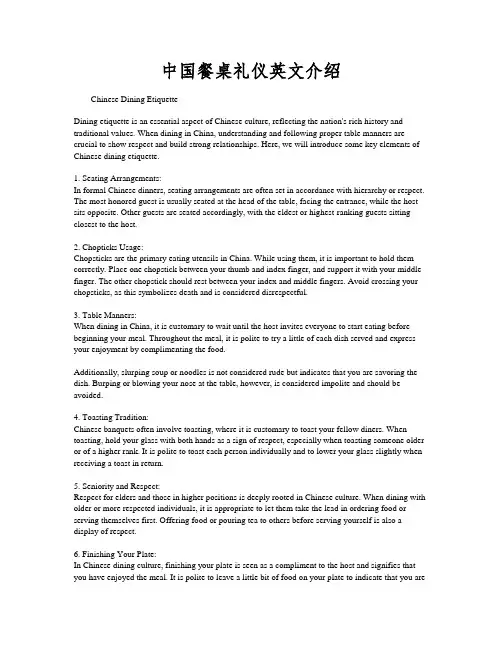
中国餐桌礼仪英文介绍Chinese Dining EtiquetteDining etiquette is an essential aspect of Chinese culture, reflecting the nation's rich history and traditional values. When dining in China, understanding and following proper table manners are crucial to show respect and build strong relationships. Here, we will introduce some key elements of Chinese dining etiquette.1. Seating Arrangements:In formal Chinese dinners, seating arrangements are often set in accordance with hierarchy or respect. The most honored guest is usually seated at the head of the table, facing the entrance, while the host sits opposite. Other guests are seated accordingly, with the eldest or highest-ranking guests sitting closest to the host.2. Chopticks Usage:Chopsticks are the primary eating utensils in China. While using them, it is important to hold them correctly. Place one chopstick between your thumb and index finger, and support it with your middle finger. The other chopstick should rest between your index and middle fingers. Avoid crossing your chopsticks, as this symbolizes death and is considered disrespectful.3. Table Manners:When dining in China, it is customary to wait until the host invites everyone to start eating before beginning your meal. Throughout the meal, it is polite to try a little of each dish served and express your enjoyment by complimenting the food.Additionally, slurping soup or noodles is not considered rude but indicates that you are savoring the dish. Burping or blowing your nose at the table, however, is considered impolite and should be avoided.4. Toasting Tradition:Chinese banquets often involve toasting, where it is customary to toast your fellow diners. When toasting, hold your glass with both hands as a sign of respect, especially when toasting someone older or of a higher rank. It is polite to toast each person individually and to lower your glass slightly when receiving a toast in return.5. Seniority and Respect:Respect for elders and those in higher positions is deeply rooted in Chinese culture. When dining with older or more respected individuals, it is appropriate to let them take the lead in ordering food or serving themselves first. Offering food or pouring tea to others before serving yourself is also a display of respect.6. Finishing Your Plate:In Chinese dining culture, finishing your plate is seen as a compliment to the host and signifies that you have enjoyed the meal. It is polite to leave a little bit of food on your plate to indicate that you aresufficiently satisfied.By following these Chinese dining etiquettes, you will not only show respect for the Chinese culture but also enhance your dining experience by enjoying the delicious cuisine. Remember, Chinese dining is not just about the food; it is about harmonious social interactions and building friendships.。
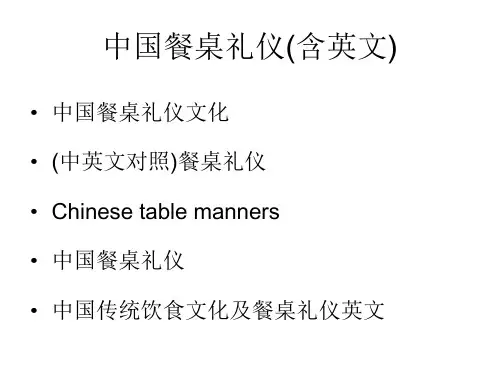
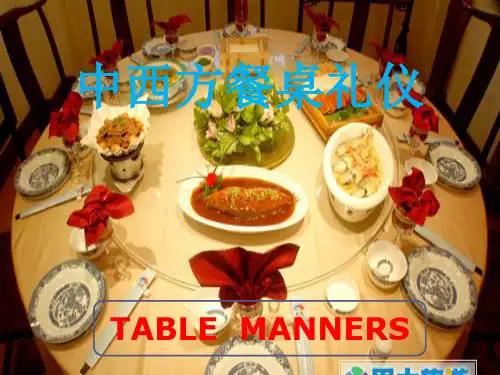

中国餐桌礼仪文化英文下面是我为大家整理的英文版中国餐桌礼仪加上翻译版哦!需要的参考以下。
中国餐桌礼仪文化英文版:1. admission etiquette. ask guests seated on the seats. please elderly guests in attendance were seated next to attendance at from the left side into the chair. admission dongkuaizi not after. what more do not come to beep. not to get up walk. if what happened to the owner notice. second, when the meal. ask guests. long the dongkuaizi. jiacai, each less. far from the food on their own eat some. meal not a voice. heshang also not a sound use kaitang i spoon a small drink and a small mouth. pawan front-lips not drink, soup, hot cool after zaikai. side not to drink while blowing some people prefer to chew food to eat. extraordinary feel like work is crisp chewing food, a very clear voices. this is not etiquette demands. extraordinary and everyone is eating together, as far as possible to prevent the emergence of this phenomenon.third: do not eat hiccup, other voices will not arise if there sneezing, changming involuntarily, such as the sound, it is necessary to say i am sorry.; i am sorry;. of the original cooler. within the words . to show regret.fourth if guests or elders give cloth dish. best use of chopsticks may also be the guests or elders far away from the dishes to their front, according to the habit of the chinese nation. dish is a one of the top. if thesame tables leadership, the elderly, the guests said. whenever of a new dish, let them first dongkuaizi. rotation or invite them to the first dongkuaizi. to show their importance.fifth: eat the head, fishbone, bones and other objects, not wangwaimian vomit, not onto the ground still. slowly to get their hands diezili, or close on their own or on canzhuobian prepared beforehand good on paper. sixth: to a timely manner about the time and people just a few humorous, to reconcile the atmosphere. guangzhaotou not eat, regardless of others, and do not devour and destroy the lavish meal, not jail sentence.7: it is best not to the dinner table tiya if it is to tiya, will use napkins or sign blocked their mouths.8: to clear the main tasks of the meal. must be clear to do business oriented. feelings or to the main contact. mainly or to eat. if it is the former, when attention should be paid to the seating arrangements. their main negotiators the seats near each other to facilitate conversations, or dredge emotion. if it is the after. need only pay attention to common-sense courtesy on the line, to focus on the appreciation of dishes,9: the last time left. must be expressed gratitude to the host. at the invitation of the owner or to their own homes after the house to show backchina is the etiquette of helping people, minsishiweitian, dining how can no rules! while stressing that no attention is three meals a day, but do not know know better than ok!1. inviting guests to notice, ruxi 6:00, 5:50才叫your elderly guests, it does not.2. hosts who looked to be late; guests should be 5-10 minutes late, and this is very considerate guests oh, and pay attention to grasp, natural host and the guest are huan.3. if sit round a table, facing the door of the main blocks, or back * walls, counters; emphasize some hotels will be used napkins distinction, the highest position napkins can not casually sit oh, unless you intend to good banquet woven?: d4. masters of the subject and object of the right hand side, the left hand side of the important guests; * gate facing the master, of course, is run errands entertain the peiqia sit you.5. guests do not directly to the members of a la carte and calling guidance, obediently waiting for the hosts who looked to be a la carte if guests really serious taboos or hobbies, and should be gently told the hosts who looked, the owner of natural putting his interests and meet guests little or significantly requirements.6. hosts who looked not need points or less grasping points, or holding food dishes, such as crab, lobster legs, ribs, and so on. for a meal to the three dishes such a rule no. what can be said etiquette!7. not a small amount of force will not object to others drink winewithout fragmentation feast!8. on the wine servings! foreigner likes to boast of skill, people may boast their own point-for the food, hosts who looked at carefully observed liangcai qi, every cup have drinks later, when immediately drank to welcome the start. . . like, rotating disk or right hand side indicate the subject and object moving first chopsticks. tuirang subject and object should not be too long, oh, we stomachs are hungry, it will eat you open! do not forget to eat the praise of some oh.9. after one of every dish, although the waiter and owner will still go before the subject and object, but not too rigidly stick with you, if just in front of me, dead people rotating disc, i would first folder a small taste of chopsticks !10. hosts who looked often to the disk will cater to the vast majority of guests; peiqia then added services to entertain; guests can not touch the hands of disk integrity and eat meals, the two sides are also huan you. 11. if there is no attendant at the food or chopsticks, gongbiao, jiacai the first time can be good, must not use their own chopsticks to pick in the session to pick, and even stirring! not everyone is like love, like you do not mind the saliva chopsticks! usually identified from their recent selection part.12. let chopsticks on the best food in their transition to a dish in only into the mouth. phase seem to be eating is not so urgent.13. when chewing food in the mouth, remember bijin lips is a major event, so to speak, falling objects, shishui spills, as well as to avoid a puma puma ji ji annoyance beep. 14. during the meal, or both before and after the meal, should be back straight, as far as possible but not later * chairs sit. during the meal, basically in the hands above the desktop. 15. the master of a very good appetite, and weight loss are guests, not the fanju oh.译:中国餐桌礼仪文化以下几点一.入座的礼仪.先请客人入座上席.在请长者入座客人旁依次入座,入座时要从椅子左边进入.入座后不要动筷子.更不要弄出什么响声来.也不要起身走动.假如有什么事要向主人打招呼.第二,进餐时.先请客人.长着动筷子.夹菜时每次少一些.离自己远的菜就少吃一些.吃饭时不要出声音.喝汤时也不要出声响,喝汤用汤匙一小口一小口地喝.不宜把碗端到嘴边喝,汤太热时凉了以后再喝.不要一边吹一边喝.有的人吃饭喜欢用咀嚼食物.非凡是使劲咀嚼脆食物,发出很清楚的声音来.这种做法是不合礼仪要求的.非凡是和众人一起进餐时,就要尽量防止出现这种现象.第三:进餐时不要打嗝,也不要出现其他声音,假如出现打喷嚏,肠鸣等不由自主的声响时,就要说一声真不好意思.;对不起;.请原凉.之内的话.以示歉意.第四;假如要给客人或长辈布菜.最好用公筷.也可以把离客人或长辈远的菜肴送到他们跟前,按我们中华民族的习惯.菜是一个一个往上端的.假如同桌有领导,老人,客人的话.每当上来一个新菜时就请他们先动筷子.或着轮流请他们先动筷子.以表示对他们的重视.第五:吃到鱼头,鱼刺,骨头等物时,不要往外面吐,也不要往地上仍.要慢慢用手拿到自己的碟子里,或放在紧靠自己餐桌边或放在事先预备好的纸上.第六:要适时地抽空和左右的人聊几句风趣的话,以调和气氛.不要光着头吃饭,不管别人,也不要狼吞虎咽地大吃一顿,更不要贪杯.第七:最好不要在餐桌上剔牙.假如要剔牙时,就要用餐巾或手挡住自己的嘴巴.第八:要明确此次进餐的主要任务.要明确以谈生意为主.还是以联络感情为主.或是以吃饭为主.假如是前着,在安排座位时就要注重.把主要谈判人的座位相互靠近便于交谈或疏通情感.假如是后着.只需要注重一下常识性的礼节就行了,把重点放在欣赏菜肴上,第九:最后离席时.必须向主人表示感谢.或者就此时邀请主人以后到自己家做客,以示回中国人乃礼仪之帮,民以食为天,用餐岂能没有规矩!虽然说讲不讲究都是一日三餐,但是知道总比不知道好吧!1。

餐桌上的礼仪(中英文对照)1、In china, it is a tradition for our Chinese people to eat with chopsticks. Each of persons in the dinner table would have a pair of chopsticks, and there is also an extra one that is for public use.2、When people are eating, it is very impolite to eat with a loud sound. And to speak while food is still in the mouth is not allowed in China as well.3、Another thing should remember when a forEigner visits Chinese families is that they should let the older ones in the family to eat first, if the elder ones do not start, everyone else should not start either.4、Do not eat only one dish even if that is your favorite one, you should eat other dishes too. To eat merely one dish all the times is another bad habit in Chinese eyes.5、When Chinese people say: “ I put a little bit more sugar in this fish,I hope you do not mind” generally speaking, it is a typical saying which can indicate one of our Chinese characters-----humble. Thus, you must not take it serious and must not say:“yeah, so it is, but I do not mind.” You should say “does it? I do not think so, it is the best flavor that I have never tasted before.”1推荐第一,入座的礼仪。
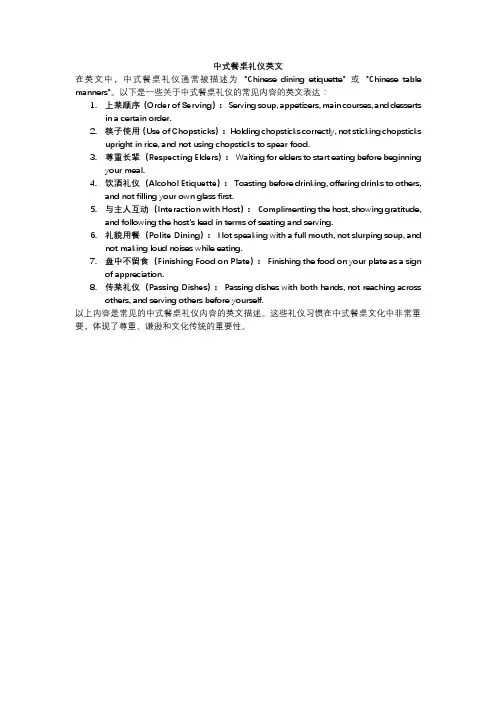
中式餐桌礼仪英文在英文中,中式餐桌礼仪通常被描述为"Chinese dining etiquette" 或"Chinese table manners"。
以下是一些关于中式餐桌礼仪的常见内容的英文表达:1.上菜顺序(Order of Serving):Serving soup, appetizers, main courses, and dessertsin a certain order.2.筷子使用(Use of Chopsticks):Holding chopsticks correctly, not sticking chopsticksupright in rice, and not using chopsticks to spear food.3.尊重长辈(Respecting Elders):Waiting for elders to start eating before beginningyour meal.4.饮酒礼仪(Alcohol Etiquette):Toasting before drinking, offering drinks to others,and not filling your own glass first.5.与主人互动(Interaction with Host):Complimenting the host, showing gratitude,and following the host’s lead in terms of seating and serving.6.礼貌用餐(Polite Dining):Not speaking with a full mouth, not slurping soup, andnot making loud noises while eating.7.盘中不留食(Finishing Food on Plate):Finishing the food on your plate as a signof appreciation.8.传菜礼仪(Passing Dishes):Passing dishes with both hands, not reaching acrossothers, and serving others before yourself.以上内容是常见的中式餐桌礼仪内容的英文描述。
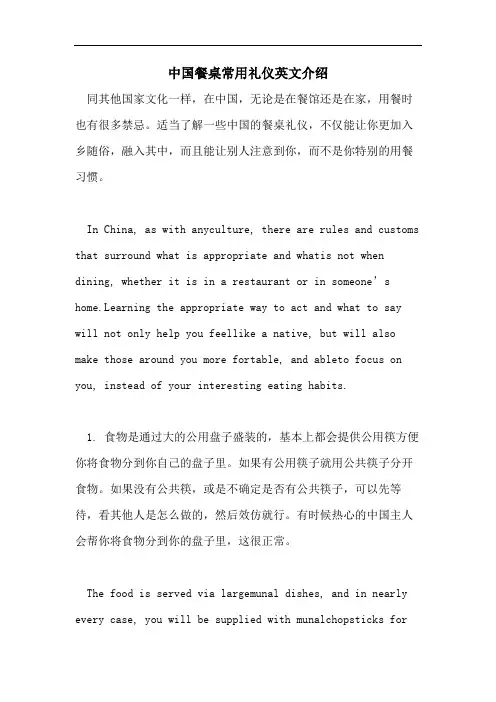
中国餐桌常用礼仪英文介绍同其他国家文化一样,在中国,无论是在餐馆还是在家,用餐时也有很多禁忌。
适当了解一些中国的餐桌礼仪,不仅能让你更加入乡随俗,融入其中,而且能让别人注意到你,而不是你特别的用餐习惯。
In China, as with anyculture, there are rules and customs that surround what is appropriate and whatis not when dining, whether it is in a restaurant or in someone’s home.Learning the appropriate way to act and what to say will not only help you feellike a native, but will also make those around you more fortable, and ableto focus on you, instead of your interesting eating habits.1. 食物是通过大的公用盘子盛装的,基本上都会提供公用筷方便你将食物分到你自己的盘子里。
如果有公用筷子就用公共筷子分开食物。
如果没有公共筷,或是不确定是否有公共筷子,可以先等待,看其他人是怎么做的,然后效仿就行。
有时候热心的中国主人会帮你将食物分到你的盘子里,这很正常。
The food is served via largemunal dishes, and in nearly every case, you will be supplied with munalchopsticks fortransferring food from the main dishes to your own. You shoulduse the munal chopsticks if they are supplied. If they are not or you areunsure, wait for someone to serve food to their own plate, and then copy whatthey do. On oasion, an eager Chinese host may place food into your bowl or onyour plate. This is normal.2. 分到你盘子的食物你不吃是很失礼的。
中国餐桌礼仪英文我们国家是一个传统的礼仪之邦,在学习好本国的餐桌礼仪,也要学习别人的餐桌礼仪,这是我们的待客之道,看我带来的最全的餐桌礼仪英文攻略!中国餐桌礼仪英文一中国餐桌礼仪常用英文表达1.让客人和长辈先吃每一道菜let the elder people and the customer eat first2.不要用筷子敲碗dont use the chopsticks hit the bowl3.不要将手伸到饭桌对面夹菜dont reach to get the food on the opposite side4.等大家到齐了,才开始吃dont eat until everyone is there5.为主人的长寿、健康、成功干杯wish for the people who host the dinner中国餐桌礼仪英文二1 take the seats2 have meals3 leave from the feast first: the manners of taking seatslead the guest to the seat of honor,then lead the senior to the seat next to the guest; take the seat from left; dont start eating in a hurry or make any noise;dont stand up and move;inform the master when you have something urgent. after take theseat, keep a proper posture; keep your feet under your seat, dont straighten or step under othersseats; dont keep your elbows?肘部?to the edge of the table or put your hands on another chairs back . second :manners at mealtimesask the visitor and the elderto move the chopsticks first.the hosts should help the guests to the food or ask them to help themselves.eat with little noise and movement. do not make a hiccup (打嗝?or a soundlike a hiccup.you may not slurp(出声地吃喝?your soup.dont eat until everyone is there. dont reach to get the food on the opposite side. help people to dish with servingchopsticks, centiliter(公勺?, and never help people to dish with chopsticks or your used ladle?长柄勺?.dont spit the fishbone or litter it everywhere, you should takeit out with your hands, then put it on the napkin or your empty plate. timely talking can enliven the atmosphere of the mealtimes. so do not think of nobody but yourself.and may not bolt down(狼吞虎咽?your food.had better not pick your teeth with a toothpick. if you must do it, you should screen your mouth with napkin or your hands.definitude the primary mission of the meal. if it is a business meal, let the main negotiators seat together to communicate with each other.however if it is only to make friendlycontacts, what you need to do is just to pay attention to some commonsocial courtesies and lay a lot of stress on dish appreciation. third: leave the feastmaster; or invite the masterto your house hereafter . thanks for your entertainment!when leave the feast, you should show your thank to the mastervisitor thanks for your attention ?中国餐桌礼仪英文三1. admission etiquette. ask guests seated on the seats. pleaseelderly guests in attendance were seated next to attendance at from the left side into the chair. admission dongkuaizi not after. what more do not come to beep. not to get up walk. if what happened to the owner notice.second, when the meal. ask guests. long the dongkuaizi. jiacai,each less. far from the food on their own eat some. meal not a voice. heshang also not a sound use kaitang i spoon a small drink and a small mouth. pawan front-lips not drink, soup,hot cool after zaikai. side not to drink while blowing some people prefer to chew food to eat. extraordinary feel like work is crisp chewing food, a very clear voices. this is not etiquette demands.extraordinary and everyone is eating together, as far as possible to prevent the emergence of this phenomenon.third: do not eat hiccup, other voices will not arise if there sneezing, changming involuntarily, such as the sound, it is necessary to say i am sorry.; i am sorry;. of the original cooler. within the words . to show regret.fourth if guests or elders give cloth dish. best use of chopsticks may also be the guests or elders far away from the dishes to their front, according to the habit of the chinese nation.dish is a one of the top. if the same tables leadership, the elderly, the guests said. whenever of a new dish, let them first dongkuaizi. rotation or invite them to the first dongkuaizi. to show their importance.fifth: eat the head, fishbone, bones and other objects, not wangwaimian vomit, not onto the ground still. slowly to get their hands diezili, or close on their own or on canzhuobian prepared beforehand good on paper. sixth: to a timely manner about the time and people just a few humorous, to reconcile the atmosphere. guangzhaotou not eat, regardless of others, and do not devour and destroy the lavish meal, not jail sentence.7: it is best not to the dinner table tiya if it is to tiya, will use napkins or sign blocked their mouths.8: to clear the main tasks of the meal. must be clear to do business oriented. feelings or to the main contact. mainly or to eat. if it is the former, when attention should bepaid to the seating arrangements. their main negotiators theseats near each other to facilitate conversations, or dredge emotion. if it is the after. need only pay attention to common-sense courtesy on the line, to focus on the appreciation of dishes,9: the last time left. must be expressed gratitude to the host. at the invitation of the owner or to their own homes after the house to show backchina is the etiquette of helping people, minsishiweitian, dining how can no rules! while stressing that no attention is three meals a day, but do not know know better than ok!1. inviting guests to notice, ruxi 6:00, 5:50才叫your elderly guests, it does not.2. hosts who looked to be late; guests should be 5-10 minutes late, and this is very considerateguests oh, and pay attention to grasp, natural host and the guest are huan. 3. if sit round a table, facing the door of the main blocks, or back * walls, counters; emphasize some hotelswill be used napkins distinction, the highest position napkins can not casually sit oh, unless you intend to good banquet woven?: d4. masters of the subject and object of the right hand side,the left hand side of the important guests; * gate facing the master, of course, is run errands entertain the peiqia sit you. 5. guests do not directly to the members of a la carteand calling guidance, obediently waiting for the hosts who looked to be a la carte if guests really serious taboos or hobbies, and should be gently told the hosts who looked, theowner of natural putting his interests and meet guests little or significantly requirements. 6. hosts who looked not need points or less grasping points, or holding food dishes,such as crab, lobster legs, ribs, and so on. for a meal to the three dishes such a rule no. what can be said etiquette! 7. not a small amount of force will not object to others drink wine without fragmentation feast! 8. on the wine servings! foreigner likes to boast of skill, people may boast their own point-for the food, hosts who looked at carefully observed liangcai qi, every cup have drinks later, when immediately drank to welcome the start. . . like, rotating disk or right hand side indicate the subject and object moving first chopsticks. tuirang subject and object shouldnot be too long, oh, we stomachs are hungry, it will eat you open! do not forget to eat the praise of some oh. 9. after one of every dish, although the waiter and owner will stillgo before the subject and object, but not too rigidly stick with you, if just in front of me, dead people rotating disc, i would first folder a small taste of chopsticks ! 10.hosts who looked often to the disk will cater to the vast majority ofguests; peiqia then added services to entertain; guests can not touch the hands of disk integrity and eatmeals, the two sides are also huan you. 11. if there is no attendant at the food or chopsticks, gongbiao, jiacai the first time can be good, must not use their own chopsticksto pick in the session to pick, and even stirring! not everyone is like love, like you do not mind the saliva chopsticks! usually identified from their recent selection part. 12. let chopsticks on the best food in their transition to a dish in only into the mouth. phase seem to be eating is not so urgent. 13. when chewing food in themouth, remember bijin lips is a major event, so to speak, falling objects, shishui spills, as well as to avoid a puma puma ji ji annoyance beep. 14. during the meal, or both before and after the meal, should be back straight, as far as possible but not later * chairs sit. during the meal , basically in the hands above the desktop. 15. the master of a very good appetite, and weight loss are guests, not the fanju oh.中国餐桌上的礼仪归结为以下几点:一.入座的礼仪.先请客人入座上席.在请长者入座客人旁依次入座,入座时要从椅子左边进入.入座后不要动筷子.更不要弄出什么响声来.也不要起身走动.假如有什么事要向主人打招呼.第二,进餐时.先请客人.长着动筷子.夹菜时每次少一些.离自己远的菜就少吃一些.吃饭时不要出声音.喝汤时也不要出声响,喝汤用汤匙一小口一小口地喝.不宜把碗端到嘴边喝,汤太热时凉了以后再喝.不要一边吹一边喝.有的人吃饭喜欢用咀嚼食物.非凡是使劲咀嚼脆食物,发出很清楚的声音来.这种做法是不合礼仪要求的.非凡是和众人一起进餐时,就要尽量防止出现这种现象.。